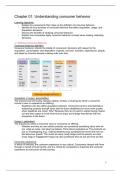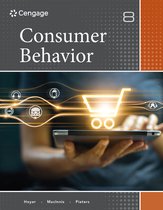Chapter 01: Understanding consumer behavior
Learning objectives
- Explain the components that make up the definition of consumer behavior.
- Identify the four domains of consumer behavior that affect acquisition, usage, and
disposition decisions.
- Discuss the benefits of studying consumer behavior.
- Explain how companies apply consumer behavior concept when making marketing
decisions.
1-1 Defining Consumer Behavior
Consumer behavior definition
Consumer behavior reflects the totality of consumers’ decisions with respect to the
acquisition, consumption, and disposition of goods, services, activities, experiences, people,
and ideas by (human) decision-making units over time.
Acquisition (= kopen, aanschaffen)
The process (can be buying, leasing, trading, renting, or sharing) by which a consumer
comes to own or experience an offering.
- Deadlines can also affect acquisition behavior: Consumers tend to procrastinate in
redeeming coupons and gift cards with far-future deadlines but move more quickly
when deadlines are closer. Why? Because they do not want to regret having missed
out and they expect to have more time to enjoy and indulge themselves with the
acquisition in the future.
Usage (= gebruiken)
The process by which a consumer uses or consumes an offering.
- Whether and why we use certain products can symbolize something about who we
are, what we value, and what we believe. Think about examples as: The products we
use on Thanksgiving (e.g., making desserts) may symbolize the event and how we
feel about our guests. The music we enjoy (Lady Gaga) and the jewelry we wear
(nose rings or engagement rings) can also symbolize who we are and how we feel.
Consumer experience
In terms of services, the customer experience is very critical. Consumers interact with firms
through a myriad of touch points, and it is critical for companies to maximize the customer
experience at every point of their journey.
1
, - For example, Hilton attempts to accomplish this by providing a great experience on
the website, at arrival, at check in, when entering the room, at the restaurant, and so
on.
Disposition (=weg doen, weggooien, weggeven)
The process by which a consumer discards an offering (think about recycling, selling them in
a vintage store or Marktplaats, rent them via sharing websites, or lend them to others).
- Movement/trend in the market are the motivate earth-friendly products.
Managing money and making financial decisions
Four segments of consumers in terms of financial well-being:
- Stretched spenders (live paycheck to paycheck and feel anxious about their financial
situation)
- Carefree spenders (live paycheck to paycheck and do not feel anxious about their
financial situation)
- Security seekers (don’t live paycheck to paycheck, yet feel anxious about their
financial situation)
- Cushioned savers (don’t live paycheck to paycheck and do not feel anxious about
their financial situation).
Two different types of consumption that are connected to consumer behavior
- Solid consumption
Which is enduring, ownership-based, and material. Example: having an own bought car
- Liquid consumption
Consumption without ownership. Such consumption is short term, access based,
dematerialized, and focused on values of flexibility, adaptability, lightness, and detachment.
Example: using Uber or Lyft
Eight Ways to Acquire an Offering
There are many ways that consumers can acquire an offering.
Acquisition Method Description
Buying Buying is a common acquisition method used for many offerings.
Trading Consumers might receive a good or service as part of a trade.
Renting, lending or Instead of buying, consumers rent or lease cars, furniture, vacation
leasing (temporary) homes, and more.
Bartering Consumers (and businesses) can exchange goods or services
without having money change hands.
Gifting Each society has many gift-giving occasions as well as informal or
formal rules dictating how gifts are to be given, what is an
appropriate gift, and how to respond to a gift.
Finding Consumers sometimes find goods that others have lost (hats left on
a bus) or thrown away.
Stealing Because various offerings can be acquired through theft, marketers
have developed products to deter this acquisition method, such as
alarms to deter car theft.
Sharing Another method of acquisition is by sharing or borrowing. Some
types of “sharing” are illegal and border on theft, as when
consumers copy and share movies. A “sharing economy” has now
developed through online communities.
2
,Ways of Disposing of an Offering
Consumers who want to dispose of a tangible product have several options:
- Find a new use for it. Using an old toothbrush to clean rust from tools or making
shorts out of an old pair of jeans shows how consumers can continue using an item
instead of disposing of it.
- Get rid of it temporarily. Renting or lending an item is one way of getting rid of it
temporarily.
- Get rid of it permanently. Throwing away an item, sending it to a recycling center,
trading it, giving it away, or selling it are all ways to get rid of it permanently. However,
some consumers refuse to throw away things that they regard as special, even if the
items no longer serve a functional purpose.
In fact, when it comes to decisions about whether to consume something now or later,
consumers tend to be more impatient about consuming experiential (e.g., vacations, movies)
than material purchases.
Sales of a product can be increased when the consumer:
- uses larger amounts of the product.
- uses the product more frequently.
- uses it for longer periods of time.
A perceptual map is a graph that shows marketers how consumers view other brands in
comparison with their own.
3
,1-2 Ways affects Consumer Behavior?
The many factors that affect acquisition, usage, and disposition decisions can be classified
into four broad domains:
- The psychological core
- The process of making decisions
- The consumer's culture
- Consumer behavior outcomes
The psychological core (INTERNAL PROCESS)
Motivation, Ability, and Opportunity Motivatie, bekwaamheid en kansen
Exposure, Attention, Perception, and Blootstelling, aandacht, perceptie en begrip
Comprehension
Memory and Knowledge Geheugen en kennis
Forming and Changing Attitudes Vormen van attitude/mening en deze
aanpassen/veranderen
The process of making decisions
Problem Recognition and the Search for Probleemherkenning en het zoeken naar
Information informatie
Making Judgments and Decisions Oordelen en beslissingen nemen
Making Postdecision Evaluations Evaluaties achteraf maken
The consumer’s culture (EXTERNAL PROCESS)
Reference Groups and Other Social Referentiegroepen en andere sociale
invloeden
Diversity Influences Invloeden van diversiteit
Household and Social Class Influences Invloeden vanuit het huisouden zoals familie
en sociale klassen
Values, Personality, and Lifestyle Waarden, persoonlijkheid en levensstijl
Consumer behavior Outcomes and Issues
Consumer Behaviors Can Symbolize Who Consumentengedrag kan symboliseren wie
We Are we zijn
Consumer Behaviors Can Diffuse through Consumentengedrag kan zich via een markt
a Market verspreiden
Consumer Behavior, Ethics, and Social Consumentengedrag, ethiek en sociale
Responsibility verantwoordelijkheid
4
, 1-3 Who Benefits from the Study of Consumer Behavior?
The reasons are as varied as the four different groups who use consumer research:
- Marketing managers,
- Ethicists and advocates
- Public policy makers and regulators
- Consumers
Marketing definition
Marketing is the activity, set of institutions, and processes for creating, communicating,
delivering, and exchanging offerings that have value for customers, clients, partners, and
society at large.
Benefits of studying consumer behavior
- Marketers need consumer behavior insights to understand what consumers and
clients value; only then can they develop, communicate, and deliver appropriate
goods and services.
- Understanding consumer behavior is crucial for legislators, regulators, and
government agencies in developing policies and rules to protect consumers from
unfair, unsafe, or inappropriate marketing practices.
- Understanding consumer behavior is important in the academic world for two
reasons. First, academics disseminate knowledge about consumer behavior when
they teach courses on the subject. Second, academics generate knowledge about
consumer behavior when they conduct research focusing on how consumers act,
think, and feel when acquiring, using, and disposing of offerings.
- Understanding consumer behavior enables marketers and other organizations to
provide tools for more informed decision-making.
à For example, research indicates that we better understand the differences among
brands when we can view a chart, matrix, or grid comparing brands and their
attributes.
5






